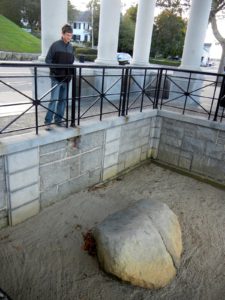Robert Spano and the Atlanta Symphony, Music of Ralph Vaughan Williams (Telarc). Handsome, shapely performances of the Fifth Symphony, Fantasia on a Theme by Thomas Tallis, and Serenade to Music, recorded in breathtakingly vivid digital sound. I can’t think of a better single-CD introduction to Vaughan Williams, for these three works are utterly characteristic and immediately winning. Also included is an elegant little performance by the Atlanta Symphony Chamber Chorus of the Tallis hymn tune on which RVW based his best-known composition (TT).
Archives for April 30, 2007
CD
PLAY
Biography (Pearl, 80 St. Mark’s Place, through May 20). Cheers to the Pearl Theatre Company for reviving S.N. Behrman’s 1932 play about a Neysa McMein-like portrait painter who decides to write a tell-all memoir, thus throwing one of her priggish ex-lovers into a snit. Biography is a forgotten gem of American high comedy, and this scintillating off-Broadway revival does it justice (TT).
TT: Getaway
If you’re a Manhattan drama critic, April is most definitely the cruellest month. Broadway producers are rushing to get their big-budget shows open in time to be eligible for this year’s Tonys, meaning that I have to be on the aisle night after night. I’ve been seeing too many musicals and hitting too many deadlines, so when a three-day gap opened up in my schedule, I grabbed a Zipcar, hit the road, and didn’t stop until I got to Plymouth, Massachusetts.
 My destination was a homey little waterside bed-and-breakfast located half a block north of Plymouth Rock, a ten-ton chunk of granodiorite that is said to be the rock upon which William Bradford and the Pilgrims trod when they got off the Mayflower in 1620. Whether or not the rock in question is in fact the rock in question has long been a matter of widely varying opinion, but it was identified as such in 1741, and in 1920 the state of Massachusetts put up an elegant Doric portico designed by McKim, Mead, and White in order to protect it from the depredations of chisel-wielding idiots.
My destination was a homey little waterside bed-and-breakfast located half a block north of Plymouth Rock, a ten-ton chunk of granodiorite that is said to be the rock upon which William Bradford and the Pilgrims trod when they got off the Mayflower in 1620. Whether or not the rock in question is in fact the rock in question has long been a matter of widely varying opinion, but it was identified as such in 1741, and in 1920 the state of Massachusetts put up an elegant Doric portico designed by McKim, Mead, and White in order to protect it from the depredations of chisel-wielding idiots.
I don’t know how crowded Plymouth gets when the tourist season is at its height, but on weekday afternoons in late April, you can visit Plymouth Rock pretty much all by yourself. It’s a sobering experience. Rarely does one get a chance to view such a place in solitude, there to reflect on the struggles of the first American settlers, who were so determined to live free that they risked all they had to do so.
Later that day I learned of the death of Mstislav Rostropovich, the Russian cellist and conductor. One must not grieve overmuch at the loss of a man who lived so full a life, but it’s still hard to imagine a world without Slava. I heard him give a recital in Kansas City in the late Seventies, the years of his prime, and I have indelible memories of the dazzling panache with which he charged through Benjamin Britten’s Cello Sonata, a work that had been written especially for him a decade earlier. It’s not one of Britten’s most memorable efforts, but when Rostropovich played it, you couldn’t help but think it was a five-star masterpiece.
In old age Rostropovich devoted himself to conducting, which was never his strong suit, but his youthful recordings of Tchaikovsky’s Variations on a Rococo Theme and the Shostakovich First Cello Concerto, which was written for him in 1959, leave no possible doubt that he was one of the greatest instrumentalists of the twentieth century. Amazingly enough, he was also, like Fritz Kreisler, a very good pianist, and he accompanied his wife, the soprano Galina Vishnevskaya, with the utmost flair and imagination in recital and on record. (Many of their best recordings have been reissued on this three-CD set.)
Rostropovich was more than just a great musician, of course. He was one of a handful of well-known Russian artists who were willing to put their lives on the line to protest Soviet tyranny. Allan Kozinn tells the story in his New York Times obituary:
When [Aleksandr] Solzhenitsyn came under attack by Soviet authorities in the late 1960s, Mr. Rostropovich and Ms. Vishnevskaya allowed him to stay in their dacha at Zhukovka, outside Moscow. He was their guest for four years, and Mr. Rostropovich tried to intercede on his behalf, personally taking the manuscript of “August 1914” to the Ministry of Culture and arguing that there was nothing threatening to the Soviet system in it. His efforts were rebuffed.
Mr. Rostropovich’s own troubles began in 1970 when, out of frustration with the suppression of writers, artists and musicians, he sent an open letter to Pravda, the state-run newspaper, which did not publish it. Western newspapers did.
“Explain to me, please, why in our literature and art so often people absolutely incompetent in this field have the final word,” he asked in the letter. “Every man must have the right fearlessly to think independently and express his opinion about what he knows, what he has personally thought about and experienced, and not merely to express with slightly different variations the opinion which has been inculcated in him.”
After the letter was published, Mr. Rostropovich and Ms. Vishnevskaya were unable to travel abroad and faced dwindling engagements at home….
It was not until 1974 that they were allowed out of the country again. That year they were given two-year travel visas. In the West, Mr. Rostropovich told interviewers that he missed his homeland and longed to return but that he would not do so until artists were free to speak their minds.
“I will not utter one single lie in order to return,” he said in 1977. “And once there, if I see new injustice, I will speak out four times more loudly than before.”
 Talk is cheap, and modern-day America is full of artists who bloviate at endless and enervating length about public affairs. How many of them, I wonder, would be prepared to do what Rostropovich did? As I read of his passing last week, I looked out the window of my room at the full-size replica of the Mayflower docked across the street in Plymouth Harbor, and asked myself whether I had it in me to walk away from my comfortable life for the sake of freedom. I like to think I would, but I’ve never faced such a choice, and very likely never will. People occasionally tell me that some piece of mine was “courageous,” to which I invariably respond that there’s nothing brave about writing a review. Courage is what the Pilgrims had–and what the Rostropoviches had.
Talk is cheap, and modern-day America is full of artists who bloviate at endless and enervating length about public affairs. How many of them, I wonder, would be prepared to do what Rostropovich did? As I read of his passing last week, I looked out the window of my room at the full-size replica of the Mayflower docked across the street in Plymouth Harbor, and asked myself whether I had it in me to walk away from my comfortable life for the sake of freedom. I like to think I would, but I’ve never faced such a choice, and very likely never will. People occasionally tell me that some piece of mine was “courageous,” to which I invariably respond that there’s nothing brave about writing a review. Courage is what the Pilgrims had–and what the Rostropoviches had.
* * *
Mstislav Rostropovich, Benjamin Britten, and the English Chamber Orchestra perform an excerpt from Tchaikovsky’s Rococo Variations:
TT: Almanac
“If you can’t imagine that Cupid makes you fall in love, you have no business existing.”
Mark Morris, interview with Ara Guzelimian (courtesy of Playbill)
